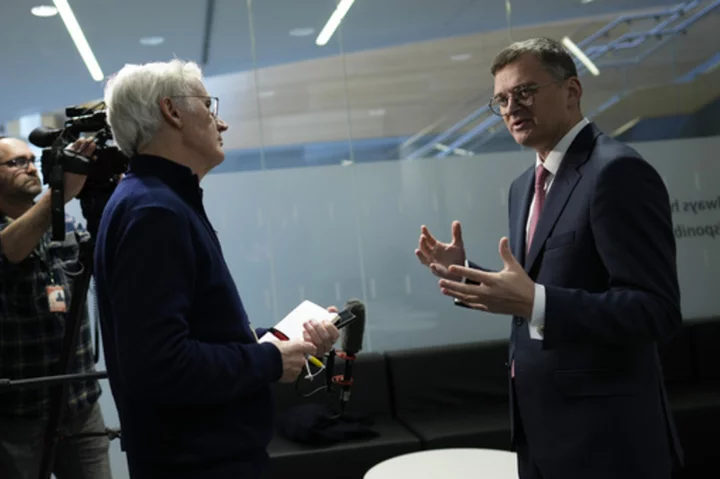BRUSSELS (AP) — Ukrainian Foreign Minister Dmytro Kuleba insisted on Wednesday that NATO allies are showing no sign of war fatigue and remain committed to helping Ukraine defend itself against Russia and take back occupied territory.
Speaking to The Associated Press, Kuleba also said that President Vladimir Putin is miscalculating if he sees any value in keeping his forces in Ukraine at least until presidential elections in the United States in a year’s time, which could usher in a new administration.
“I heard a clear ‘no’ to any reference to fatigue, and I heard (a) clear ‘yes’ to increased support to Ukraine,” Kuleba said after meeting NATO counterparts in Brussels. He said that some allies had made fresh offers of support, but he declined to provide details.
“They understand that in order for them to feel safe, in order for them not to end up in a situation where NATO’s soldiers will have to fight, Ukraine has to win in this war,” Kuleba said.
More than 650 days into the war, fighting between Russia and Ukraine has bogged down, with neither able to make significant gains. NATO believes that Russia has suffered around 300,000 casualties, but officials decline to speculate about the toll on Ukraine.
NATO as an organization does not provide military assistance to Ukraine, even though many members do on an individual basis and in groups. But supplying ammunition and equipment has become a challenge as national weapons stocks dwindle.
And the rhetoric has shifted. Six weeks ago, top NATO officials and ministers praised the slow but incremental gains that Ukraine's armed forces were making. This week, the country's mere survival was being hailed as a victory.
Still, U.S. Secretary of State Antony Blinken said the allies are “determined to make sure that Ukraine has what it needs, including to take back territory.” He said many NATO members want “to help Ukraine build a future force that can ensure deterrence, and ensure defense against aggression going forward.”
Blinken said the only thing preventing an end to the war “is Vladimir Putin and the extent to which he believes that he can somehow outlast Ukraine, outlast his people,” and Putin's refusal “to engage in any meaningful way in diplomacy or negotiations.”
A senior U.S. official said that most, if not all, NATO allies do not believe Putin will agree to any kind of deal with Ukraine until after the U.S. election, and they approach their decisions on assistance to Ukraine with that in mind.
This means not only military aid but also reconstruction assistance, economic support and help with reforms to get Ukraine on a more sustainable path to NATO membership, said the official, who spoke on condition of anonymity because of the sensitivity of the issue. He offered no specifics.
But Kuleba said that Putin is always holding out for something.
“He always waits for elections in another country to take place and for the new government and new leadership to change the attitude,” Kuleba said, “and President Putin always failed, consistently failed, in his expectations.”
He added: “There may be differences about the best ways to contain Russia, to deter Russia. But the understanding (at NATO) that Russia poses a threat is consensual, and I don’t see that changing."
The United States and European Union are struggling to provide enough funds to keep Ukraine’s war economy afloat. The money is being held up due to political infighting and convoluted decision-making.
But Ukraine is mostly focused on winning the ultimate security guarantee – what Kuleba described as “the mother of all decisions” – joining NATO and opening EU membership talks.
EU leaders will weigh that decision next month and the European Commission, which oversees the accession process, has said that talks should start soon, perhaps early in 2024. However, there is no consensus on allowing Ukraine to join NATO while the war continues.
Asked whether Ukraine intends to join both organizations with its occupied territories, including the Crimean Peninsula, Kuleba said that the whole country as it was internationally recognized in 1991 would be signing up.
“Otherwise, what was it all for?” he said. “We will win in the war. We will restore our territorial integrity.”
The NATO meeting came a day after the wife of Ukraine’s military intelligence chief was diagnosed with heavy metals poisoning. Marianna Budanova, the wife of Lt. Gen. Kyrylo Budanov, was undergoing treatment.
An official in the intelligence agency, known as GUR, said Wednesday that Budanova was poisoned with arsenic and mercury. The poisoning of several other GUR employees apart from Budanova was confirmed, said the official, speaking on condition of anonymity.
Kuleba said he had no firm information about who or what was behind it, but that “it makes sense to assume that it was an attempt on her life, because we know that Russia previously had tried to assassinate Budanov himself.”
___
Associated Press writer Hanna Arhirova in Kyiv contributed.
___
Follow AP’s coverage of the war in Ukraine at https://apnews.com/hub/russia-ukraine

